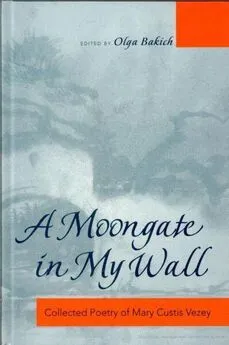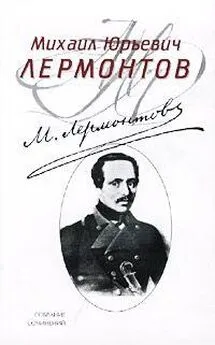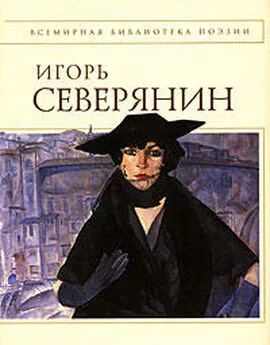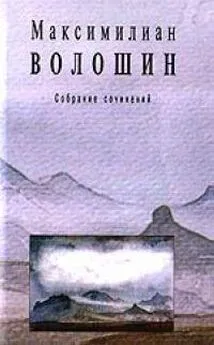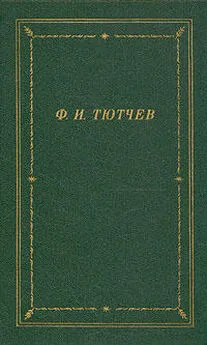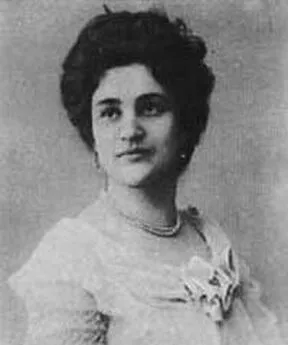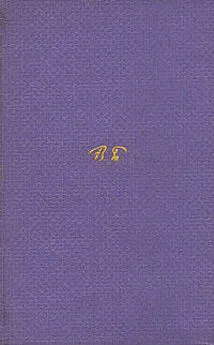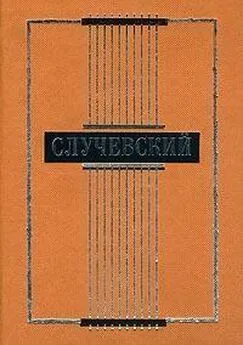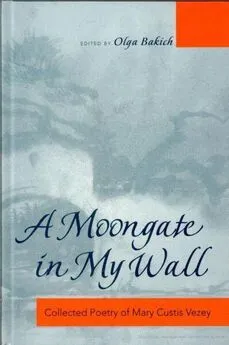Мария Визи - A moon gate in my wall: собрание стихотворений
- Название:A moon gate in my wall: собрание стихотворений
- Автор:
- Жанр:
- Издательство:Peter Lang Publishing, Inc.
- Год:2005
- Город:New York
- ISBN:0-8204-7837-7
- Рейтинг:
- Избранное:Добавить в избранное
-
Отзывы:
-
Ваша оценка:
Мария Визи - A moon gate in my wall: собрание стихотворений краткое содержание
Мария Визи (1904-1994) – поэтесса «первой волны» русской эмиграции. Данное собрание стихотворений, изданное в США, под редакцией Ольги Бакич, наиболее полное на данный момент собрание ее поэтических произведений и переводов.
Издание состоит из 4 частей и включает в себя:
1. Три опубликованных сборника М. Визи: 1929, 1936 и 1973 гг.
2. Стихотворения, не вошедшие в сборники, написанные на русском языке.
3. Стихотворения, не вошедшие в сборники, написанные на английском языке.
4. Неопубликованные переводы
Вступительная статья и комментарии на английском языке.
A moon gate in my wall: собрание стихотворений - читать онлайн бесплатно полную версию (весь текст целиком)
Интервал:
Закладка:
and cut my tether,
and take to flight,
with each small feather
glistening white;
but, oh, I waken,
and, to atone,
breathless and shaken
fall, like a stone,
and see — a token
of earthly things —
they're broken —
my shining wings!
[1936]
521. «I am a stranger here. Leave me alone…» [233] Variant in the fourth line of the first stanza in the manuscript: «and hill and meadows from my solitudes.» The manuscript indicates that Mary Vezey planned to include another stanza between the first and the second stanzas; only one line was written in brackets: «In our tall forests we had stately firs.»
I am a stranger here. Leave me alone.
My eyes are tired of your streets of stone,
your tower houses; I am used to wood
and hill and meadows and to solitude.
All now is ended — all the wild birds flown,
and stars burnt out which had so brightly shone —
all the tall stately firs stand bare and dead
and silent lies each empty riverbed.
Only the still brown rocks, moss-covered, keep
their watch where silver wavelets curl and creep,
and that same sky, sunless and cold and grey,
hangs, — as the morning when I sailed away.
Shanghai, 1936–1937
522. «I hope from where you sit or lie…» [234] The Norma Jean to whom this poem is dedicated has not been identified; perhaps it was Marilyn Monroe, whose real name was Norma Jeane Morrison.
Norma Jean
I hope from where you sit or lie
that you can see a patch of sky
at night, with angels flitting by,
each lighter than a sigh.
I hope that thru your window pane
you see trees, dripping in the rain,
or stooping low as under strain
where heavy snow has lain.
That you can watch a billowy cloud
sailing, like some white galleon proud,
and birds around it, crying loud,
ever a joyous crowd;
I hope that you may never tire
of watching sunlit skies on fire.
27 Nov. 1951
523 Nocturne(«White clouds…») [235] Variant in the last stanza in the manuscript: «But in her tower / high-walled, / the knight's young daughter /enthralled /forgetful of the hour/ silently watches/ the silver splotches / upon the water.»
White clouds
Remote
Like little explosions
Climb the sky and float
Above the black erosions
Of the castle moat.
Behind the grey parallelogram
Of his castle wall
The aged knight
Snores, for he doesn't really give a damn
At all
For the beauty of the night.
But in her tower
The knight's young daughter
Forgetful of the hour,
Silently watches
The silver splotches
Upon the water.
29 Mar. 1955
524. Impressions at the Opera (a true story)
Three dowagers with silver tresses
and silver foxes over pale-blue dresses
floated into their box,
fox after fox,
and settled down,
like pillows stuffed with eiderdown.
And Salvatore Baccaloni,
as Bartolo up on the stage,
though usually quite the rage,
seemed not as fat,
nor half as funny.
21 Feb. 1956
525. «It is usually very still on that day…»
It is usually very still on that day,
which comes at different times in different places;
came in the end of October in the place where I lived.
Very still and cold, and then, toward evening,
the air is suddenly warmer.
Nature stands still, you can hear the earth breathe,
the trees reach out and wait.
Stars that had been very brilliant
all at once turn opaque.
It is then that the first snowflake of the winter, always
large and slow, is wafted, like a small parachute, down
upon the expectant earth,
in hushed silence.
27 Feb. 1956
526. «With folded wings he sat and took a rest…»
With folded wings he sat and took a rest
upon a branch not far from where his nest
was hidden in the thicket from sharp eyes
and sharper claw and long,
deep in a wood of aspen and of beech
where sunrays rarely reach,
where stillness lies
and shadows hang.
Quietly he sat, small, gray and soft,
colorless lump of life, alone, aloft,
seen and admired by no one.
Then he spread
his wings,
most powerful among such minute things,
and, gray no more
but golden in the sun, he rose to soar,
and then he sang…
February 1956
527. «Nothing is left to write of any more…» [236] Po Chii-i: Bo Juyi in contemporary transcription (772–846), a Chinese poet of the Tang dynasty
Nothing is left to write of any more,
all that there is to say was said before:
all is recorded — every human breath.
The poets have discussed God, love and death,
the seasons and the land and water here,
cities around us, and the atmosphere,
creatures from the amoeba to the auk,
including beings that can sing and talk.
All you need do is listen, gratefully,
to Swinburne, or Verlaine, or Po Chu-i.
7 Mar. 1956
528. Nocturne («Late twilight in October…»)
Late twilight in October.
Stillness hangs
above primeval marshes like spun glass.
Escaping lightly from the reaching arms
of scrawny birch, the moon,
opaque and naked,
drops her seventh mist.
No rustle stirs
the elderberries. Sorrowful, a loon
raises his pointed head among the blades
of marsh grass; even he does not invade
the silence with habitual complaint.
This is when
suddenly, passing high above, departing cranes
cry out between the earth and moon
urgently, clearly, for a rapid moment;
the marshes bear their soft
provocative and wistful voices,
high in the air, yet ultimately close;
then they are gone.
And in their wake
the first large timid snowflakes
dim the moon.
15 Feb. 1957
529. «There is something you want to say…» [237] Variant in the third line of the fourth stanza in the manuscript: «cry loudly.»
There is something you want to say —
thoughts gurgling in your brain,
words choking your throat.
Say them, say them before you stop breathing,
see the darkness converging upon you
from the sky — from the shore — from the water —
The circles upon the water grow large and flat
and disappear altogether,
and the surface is silent.
Speak out — call loudly
and say all those turbulent words,
cry lustily
so that the shores will echo,
then whisper softly
those last compassionate words,
and all will be dark, dark.
1 Mar. 1957
530. «There was hoarfrost on the lawn this morning…»
There was hoarfrost on the lawn this morning
at dawn.
The seagulls were flying inland from the ocean,
to the warm earth and the grass.
They were gray in the early light
against the November sky.
1957
531. Night Dance
Little dead children, candles in their eyes,
uprooting earth, and clanging through staid skies,
remembering their ermine-mantled days,
all guillotined too soon,
dance on the lawn
where night dreams spawn
unmindful of the gaze
of the thick-skulled mongol cheek-boned moon.
Dance, slithering sprites
in this transparent trance
through all your promised perfumed nights
with well-earned mirth
which sly time pilfered on your withering earth!
Dance in the tear-soaked grass
dangling each tinkling somewhere-living heart
as void eyes dart
to where the stolid unbelieving old
grow by the snarling oak roots in a silent mold
buried en masse.
Disdain and disregard the sod-bound throng.
There is a song
composed about you and your life goes on
dancing long nights upon a moonstained lawn.
30 Oct. 1958
532. «Suddenly, I'm awake…»
Suddenly, I'm awake —
now, when my heart is sagging
and when my death, set for the take,
creaks round the nearest hill in her sure wagon.
Quite unexpectedly, the sky blows warm
as when cold day
breathes sudden fire instead
after a powerful and all-uprooting storm
risen from its day bed.
And as I stand
groping and reaching with my lips and hand,
mouth open in an agony of wanting
to fling long smouldering words that have been haunting
my loosely used, oh, many-wasted lips,
— I see the sun that dips
into the catchall of horizon and I flay
the sunless air to hold the night at bay
and rise and leave
the rock I stand on as I reach the eave
of the lowering, blackening sky above my head —
and I am dead.
30 Oct. 1958
533. Lot's Wife [238] English variant of the Russian poem «Жена Лота»; see poem 377.
I am Lot's wife. I couldn't walk away
up foreign sands, away from that poor land
where every stone was warm from my own touch
and every door and window held my shadow,
where I had walked those narrow streets of Sodom.
There I had lived among familiar people
and talked and had my various human dealings
with neighbor women and with men who traded
and knew me well and knew my husband Lot.
Though truly they had differed with our thoughts
and knew not God as Lot and I had known Him
and wouldn't listen to His words of warnings,
— they weren't worse than I: I didn't listen.
I couldn't follow Lot on that safe trail
hearing the wrath of vengeance on my town,
hearing the fall of rocks and quake of hillside,
hearing the roar of all-devouring flame,
the crying agony of men and women:
I couldn't run away: I stopped and turned —
What matter that the price I paid was life,
was immortality?
Perhaps in that brief moment
some friend or enemy before he died
breathed easier because he glimpsed, half-blinded,
through fire and smoke, beneath a fallen pillar,
my shaking arms stretched in a last farewell?
1958
Читать дальшеИнтервал:
Закладка:
